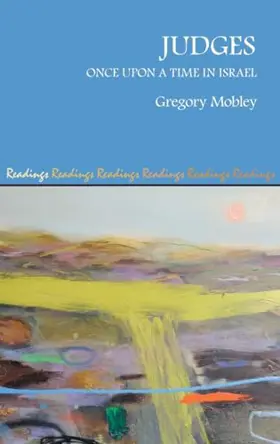

Judges
in Readings: A New Biblical Commentary
Pages
164
Publisher
Sheffield Phoenix Press
Published
2023
ISBN-13
978-1-914490-31-6
Judges is the Bible’s end-of-the-frontier epic. It depicts the first generations of Israelite life in Canaan and portrays a set of memorable protagonists, the “judges,” who were wild enough to tame a wilderness, but too wild to persist into the next era of royal courts, central shrines, and political states. The core of Judges consists of a series of narratives about the outlaws, warlords and war-ladies, mercenaries, and jackleg and priests and prophets from ancient Ephraim whose exploits were recounted in a series of redacted documents that, to the chagrin of pious readers over the centuries, ended up in the Bible, of all places.
There is Ehud, the left-handed assassin on a grim solo labyrinthine mission in and out of an enemy fortress. There is Deborah, the alpha female who, in one chapter, commands an army and, in another, is credited with uttering her eponymous song, which deserves to be counted among the world’s great war poetry. There is Jael, the man-slaughtering Bedouin woman who is handy with a hammer. There is Gideon, the insecure hero who leads, in one story, an outnumbered elite band of warriors to victory over an enemy force of uncountable proportions and, in another story, a clannish vendetta filled with torture, arson, and revenge killings. There is the tale of Abimelech which traces the rise and fall of a gangster. There is Jephthah, the outcast summoned to rescue his tribe when they need his desperado skill set, but whose rash vow has fatal consequences for his daughter. Finally, there is Samson, one of folk literature’s most memorable characterizations, a walking, talking incarnation of unshaved, unbalanced hyper-masculinity.
This reading of the tales of Judges as a set of adventure stories from the early centuries of alphabetic literacy requires that we dig through mounds of didactic, theological, moralistic, messianic, and nationalistic landfill in order to reclaim the full glory—and horror—of their dark violence and eroticism, as well as to marvel at the coarse folk poetry in the tales’ narration and dialogue.
There is Ehud, the left-handed assassin on a grim solo labyrinthine mission in and out of an enemy fortress. There is Deborah, the alpha female who, in one chapter, commands an army and, in another, is credited with uttering her eponymous song, which deserves to be counted among the world’s great war poetry. There is Jael, the man-slaughtering Bedouin woman who is handy with a hammer. There is Gideon, the insecure hero who leads, in one story, an outnumbered elite band of warriors to victory over an enemy force of uncountable proportions and, in another story, a clannish vendetta filled with torture, arson, and revenge killings. There is the tale of Abimelech which traces the rise and fall of a gangster. There is Jephthah, the outcast summoned to rescue his tribe when they need his desperado skill set, but whose rash vow has fatal consequences for his daughter. Finally, there is Samson, one of folk literature’s most memorable characterizations, a walking, talking incarnation of unshaved, unbalanced hyper-masculinity.
This reading of the tales of Judges as a set of adventure stories from the early centuries of alphabetic literacy requires that we dig through mounds of didactic, theological, moralistic, messianic, and nationalistic landfill in order to reclaim the full glory—and horror—of their dark violence and eroticism, as well as to marvel at the coarse folk poetry in the tales’ narration and dialogue.